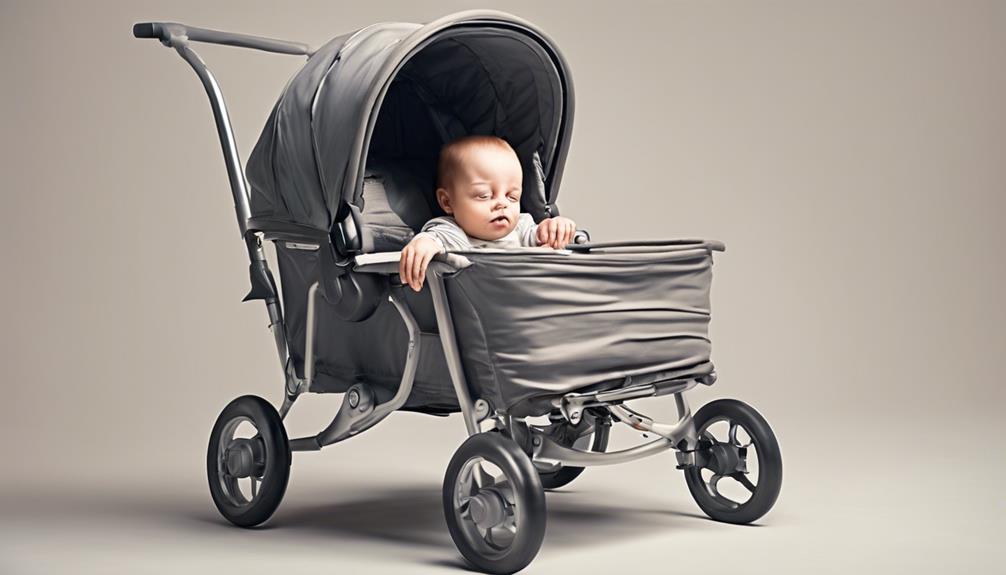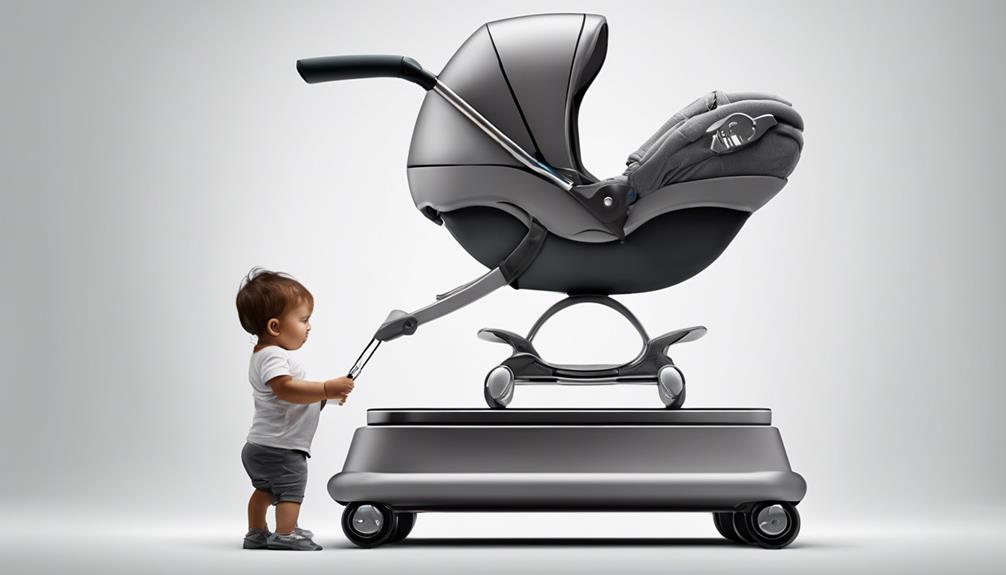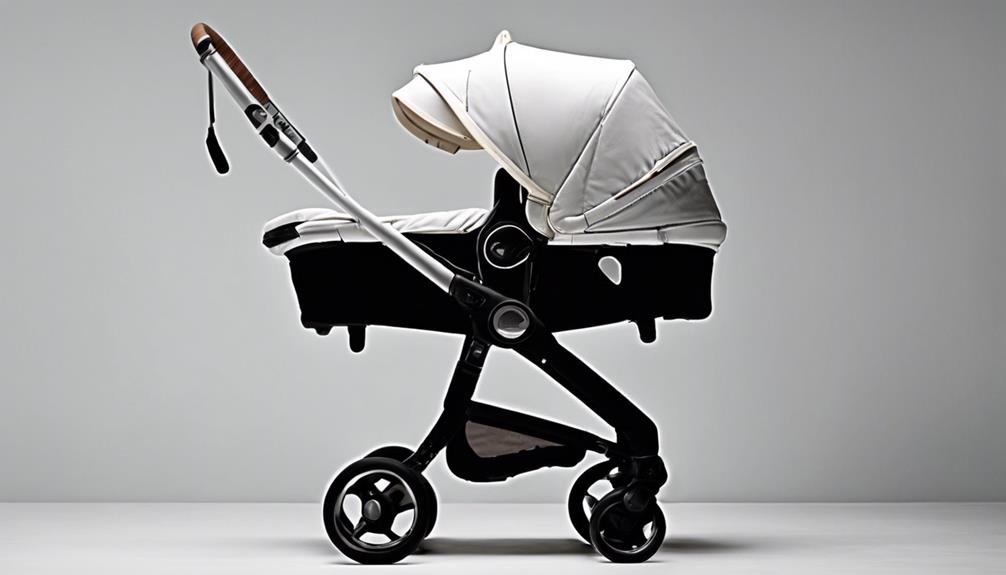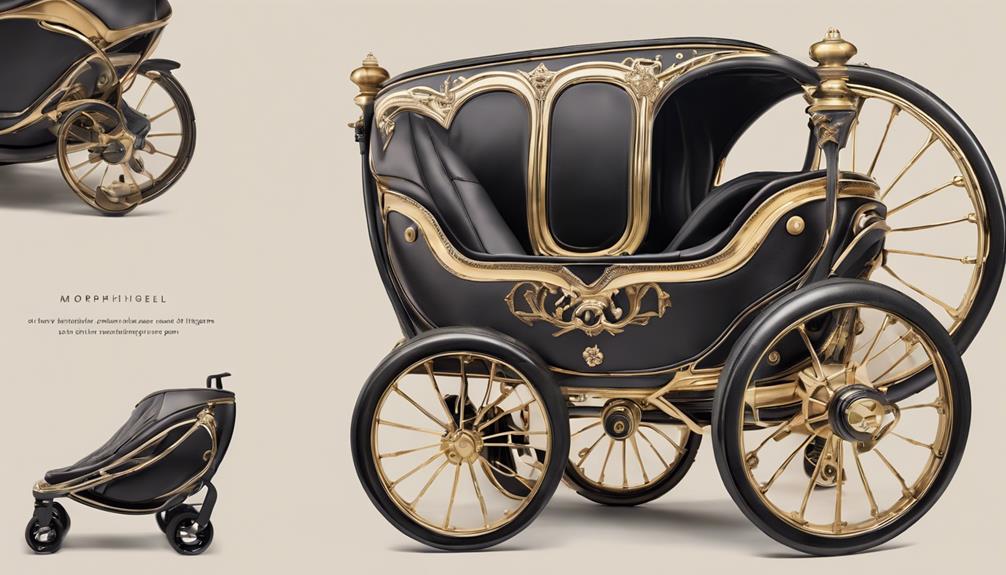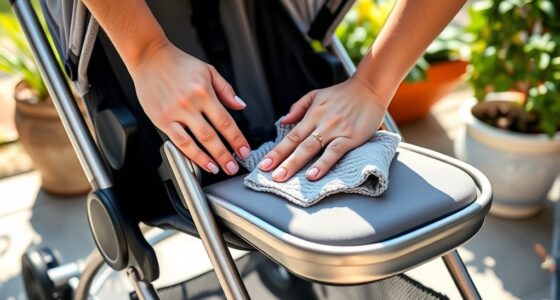When determining if your child has outgrown their stroller, it is important to consider factors such as age, size, and development for safety and comfort. Pediatricians recommend ceasing stroller use around ages 3 to 4 as children begin to demonstrate improved balance and a desire to walk independently. Indicators that they may be prepared to walk more include good balance and a keen interest in moving by themselves. Walking aids in building strength and promotes overall health. Safety and comfort concerns may arise if children exceed stroller weight or size limits. Having an understanding of these factors will help ensure a smooth transition for your child’s development. For more information on the factors that influence this crucial decision, read further.
Key Takeaways
- Assess child's age and developmental stage for stroller use.
- Observe signs of readiness like balance and interest in walking.
- Transition to walking after 24 months for strength and independence.
- Regularly check size and weight to avoid exceeding stroller limits.
- Consider practicality and alternatives based on child's capabilities.
Stroller Size Vs. Childs Age
When evaluating if a child is too big for their stroller, it's important to take into account the connection between stroller size and the child's age. Some parents might wonder if it's okay to have big kids in strollers, but understanding the role of age in this decision is key.
Pediatricians generally recommend stopping stroller use around ages 3 to 4 for typical children. This is because children around this age often show improved balance and a growing interest in walking independently. It's crucial to assess your child's age and developmental stage to determine if they've outgrown the need for a stroller.
Shifting from a stroller to walking can also be beneficial for older children, as it promotes physical development and independence. So, when considering if your child is too big for their stroller, keep their age in mind and observe their readiness to explore the world on their own two feet.
Physical Comfort and Safety Considerations

Considering the physical comfort and safety of a child in a stroller is essential for parents to prioritize to guarantee their well-being and security. When children become too big for strollers, several important factors come into play. Discomfort can arise from limited space and weight capacity, potentially leading to musculoskeletal issues due to inadequate support.
Safety concerns also emerge as children surpass the stroller's size and weight limits, compromising stability and increasing the risk of accidents. It's necessary for parents to assess their child's size, weight, and development regularly to determine if they've outgrown the stroller. Overloading a stroller with a child who's too big for it can affect maneuverability and pose safety risks.
Social Stigma and Parental Judgment
As parents, we may find ourselves maneuvering societal scrutiny and judgment when it comes to using strollers for our older children, particularly due to the social stigma attached to pushing big kids in strollers. It's common to encounter varied public opinions on this matter, with some individuals questioning the appropriateness of stroller use for kids perceived as too big.
Parents need to navigate these criticisms with resilience and confidence, understanding that each family situation is unique. Lack of awareness about individual circumstances can often lead to unwarranted judgment on parental decisions regarding stroller use. Remember, as caregivers to our children, we're most familiar with their needs and make choices that prioritize their well-being and comfort.
It's important to focus on what works for our families without letting external perceptions dictate our parenting choices. By staying true to our instincts and considering our children's needs, we can confidently handle any social stigma or judgment surrounding stroller usage for older kids.
Practicality of Stroller Usage

Using a stroller can be a practical choice for parents with young children. They provide a convenient way to transport essentials and offer a resting spot for kids who need breaks from walking long distances. Strollers can also be useful in crowded places like amusement parks or airports, helping families navigate more easily.
Stroller Weight Limit
When selecting a stroller for your child, being mindful of the weight limit is essential to guarantee safe and smooth usage. Stroller weight limits usually fall between 50-75 pounds, depending on the brand and model. Exceeding this limit can pose safety risks such as tipping over or damaging the stroller's structure.
Always refer to the manufacturer's guidelines to make sure your child's weight is within the stroller's capacity. Overloading the stroller can affect its maneuverability and stability, compromising your child's safety. Adhering to weight limits not only ensures your child's comfort and security but also prolongs the stroller's longevity.
Age Appropriate Usage
Considering your child's age and physical capabilities is crucial when determining the practicality of stroller usage. Even though strollers can be convenient, it's important to assess if your child has outgrown the need for one. Here are some important points to keep in mind:
- Pediatricians suggest moving on from strollers around ages 3-4.
- Look for signs like showing interest in independent walking and having good balance.
- Children capable of longer walks without getting tired may not need a stroller.
- Avoid hindering physical development; walking enhances strength and balance.
- Slowly phasing out stroller use after 24 months can promote independence and active habits.
Transitioning to Alternative Mobility Options

As parents, we can consider moving our older children, who've outgrown strollers, to alternative mobility options such as scooters. Shifting our kids to scooters can offer them independence and physical activity while they explore new environments. It also presents an opportunity to save money on transportation costs and cover more ground during outings.
Before heading out, it's crucial to practice scooter safety rules with our children to make sure they're familiar with proper riding techniques. When choosing a scooter, it's wise to look for a stable and compact model that suits your child's age and skill level, whether renting or purchasing.
Childs Developmental Stage Impact

Understanding the impact of a child's developmental stage is crucial when determining the right time to shift from using a stroller to promoting independent mobility. Here are some key points to keep in mind when evaluating if your child is ready to shift out of the stroller:
- Children should gradually move from strollers to walking after 24 months to promote strength and independence.
- Pediatricians recommend children stop using strollers around age 3-4 for best physical development.
- Signs your child may be ready to stop using a stroller include showing interest in walking independently and good balance.
- Walking helps children build strength, balance, and overall physical health.
- Children ready to stop using a stroller can walk longer distances without getting tired, indicating readiness for independence.
It's important to observe your child's cues and milestones to ensure a smooth shift that supports their physical development and autonomy.
Parental Preferences and Lifestyle Factors

Our parental preferences and lifestyle factors play a significant role in determining the suitability of a stroller's size for our child. Factors like our activity level, our child's growth stage, and the comfort of the stroller all come into play.
Stroller Size Suitability
Parental choices and lifestyle considerations heavily influence the size suitability of a child's stroller. When determining the right stroller size for your child, factors such as frequency of use, travel habits, and storage availability come into play.
Here are some key points to take into account:
- Opt for a larger stroller for older or bigger children for extended outings or special needs.
- Compact strollers are ideal for easy maneuvering in crowded spaces or frequent travel.
- Make sure the stroller size aligns with your family's specific needs and activities for practicality and comfort.
- Take into consideration the weight capacity of the stroller to accommodate your child's size.
- Evaluate the terrain where you'll be using the stroller to choose the appropriate size for smooth rides.
Parental Activity Level
Considering our active lifestyle, many parents prefer to encourage their older children to walk whenever possible rather than rely on a stroller. This preference stems from our desire to promote physical activity and independence in our children.
By encouraging walking, we not only foster a healthy habit but also allow our children to explore their surroundings more freely. As parents who value staying active, we find joy in seeing our children walk alongside us, engaging with the world around them.
Our decision to prioritize walking over stroller use is influenced by our commitment to leading an active lifestyle and promoting our children's development through movement and exploration. This choice reflects our belief in the benefits of physical activity for both ourselves and our children.
Childs Growth Stage
Encouraging our child to walk aligns with our active lifestyle and promotes their physical independence and exploration, factors that influence when they may outgrow their stroller.
Children's growth stages can vary greatly, impacting their comfort and suitability for stroller use as they develop physically and emotionally.
Family dynamics play an important role in deciding when a child is too big for their stroller, considering each child's unique needs and preferences.
Individual preferences also come into play, with some parents valuing the convenience of a stroller for older children while others prioritize promoting independence and physical activity.
Lifestyle factors like frequent travel or long outings may influence the decision of whether a child, especially around the age of 3-4 years old, has outgrown their stroller.
Ultimately, the decision to move away from a stroller is a personal one that should consider both the child's development stage and the family's lifestyle.
Involving the Child in Decision Making

When discussing stroller usage with your child, it's important to involve them in the decision-making process to empower their independence and encourage smoother changes. Asking your child how they feel about using the stroller can provide valuable insights into their comfort and preferences. Allowing them to express their thoughts can lead to a more seamless shift from stroller to walking.
By considering your child's needs and involving them in discussions around the stroller, you create a space for open communication and mutual understanding. Giving your child a sense of control over their transportation can positively impact their self-esteem and sense of autonomy.
Public Perception and Reactions

Let's address the public perception and reactions surrounding big kids in strollers.
- Society often judges and scrutinizes parents with big kids in strollers.
- Opinions on parenting choices are formed based on seeing older children in strollers.
- Negative reactions towards big kids in strollers stem from a lack of understanding about individual circumstances.
- Parents of older kids in strollers may face criticism and questioning from others.
- Public perception of stroller use for big kids varies widely, leading to differing opinions and reactions.
It's essential to recognize that public perception can be challenging when it comes to big kids in strollers. People may not understand the reasons behind a child still using a stroller, which can result in unwarranted criticism and scrutiny. As parents, dealing with these reactions with confidence and understanding is important. Remember, every family's situation is unique, and what works for one child may not work for another.
Respectful Online Sharing Practices

When sharing online, it's vital to prioritize privacy by always obtaining consent before posting about children, especially on sensitive topics like stroller use. Consider the potential impact of your posts on both children and parents and aim to foster a respectful dialogue.
Remember to respect boundaries and avoid publicly shaming parents or children in discussions about stroller size appropriateness.
Privacy in Sharing
Respecting privacy online requires obtaining consent before sharing photos or personal information. When it comes to sharing about children, especially in the context of using a baby carrier, it's important to prioritize their privacy and safety.
Here are some key points to keep in mind:
- Think about the long-term consequences of sharing sensitive information online.
- Safeguard children's identities by avoiding sharing identifiable details in public spaces.
- Respect personal boundaries by refraining from sharing private family matters without permission.
- Prioritize online safety by being mindful of the implications of oversharing personal information.
- Remember that protecting privacy is essential for maintaining a safe and respectful online environment for everyone involved.
Consent and Permission
To ensure ethical online sharing practices, always make sure to seek consent before posting photos of children, especially if their faces are visible. Respecting boundaries and privacy is vital when it comes to sharing about children on social media platforms.
Before sharing personal information online, consider the potential negative impact on both children and parents. It's essential to be mindful of the ethical implications of publicizing children's images without permission in today's digital age.
Frequently Asked Questions
At What Age Is a Child Too Big for a Stroller?
We believe children are typically too big for strollers around ages 3-4. It's important to notice signs like independent walking interest and good balance. Moving to walking promotes strength and independence. Letting kids walk helps them grow.
When Should I Stop Pushing My Child in a Stroller?
When should we stop pushing our child in a stroller? Recognizing signs of readiness, such as showing interest in walking and improved stamina, is crucial. Encouraging independence and physical development through walking benefits our child's overall well-being.
Can My 5 Year Old Ride in a Stroller?
We believe a 5-year-old can walk independently. Encouraging their movement helps them develop strength and independence. Riding in a stroller at that age may hinder physical growth. Let's promote healthy habits and active lifestyles by encouraging walking.
At What Age Do Kids Not Like Strollers?
As kids grow, around 2-3 years old, they often start disliking strollers. By age 4, many prefer walking. Signs include wanting to walk, discomfort, or trying to get out. Children's independence usually means stroller days end.
Conclusion
In summary, it's important to take into account the size of your child in relation to their stroller to guarantee their comfort and safety. Are they too big for their current stroller? Evaluating physical needs, social perceptions, and practicality can help guide your decision-making process.
Shifting to alternative mobility options may be necessary as your child grows. Remember, involving your child in the decision-making process can empower them and promote independence.
How will you navigate this next stage of your child's mobility needs?
